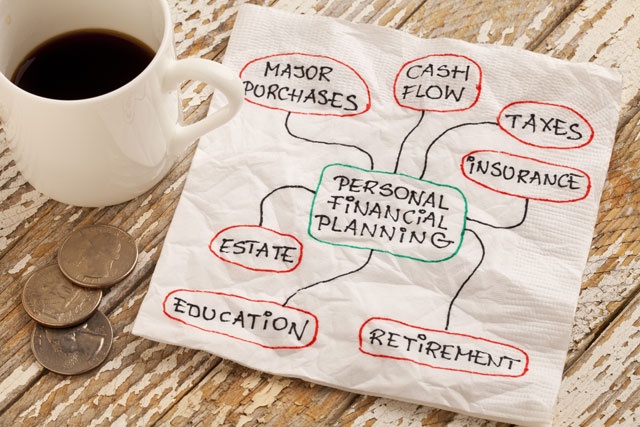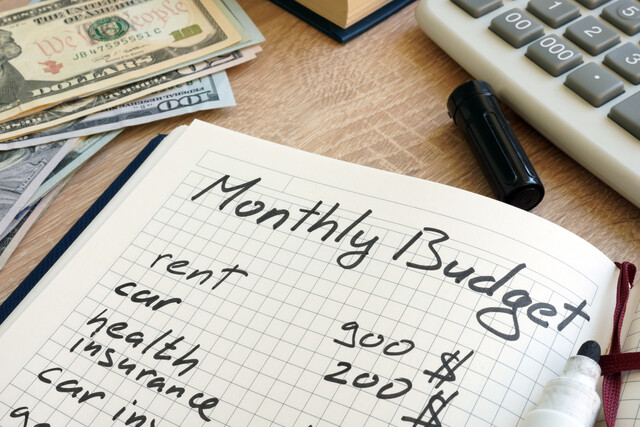Money
Most individuals live on about 70% of the amount they were making annually prior to retirement. Exactly how much money you'll need depends on your living situation. Consider how much money you'll need for the following (if any):
- Home – whether renting or owning, consider payments, maintenance, and repairs
- Living – groceries, entertainment, phones, cable, and so on
- Transportation – cars, car insurance, gas, and whether or not you'll be purchasing any special vehicles like a boat or an RV
- Travel – any anticipated travel costs for any trips
- Family – depending on the age of your family members, factor in things like weddings, funerals, college costs, braces, pets, etc.
- Health – insurance, medications, copays
- Hobbies – be sure to include any hobbies you or your spouse intend to begin in addition to existing hobbies
- Anything else you can imagine!
Self
Before deciding when to retire, do a thorough self-examination. While you may hate your job and be ready to retire, that doesn't mean you're prepared mentally or emotionally to do so. For many individuals, their work has been a focal point of their entire adult life; leaving it behind isn't always as easy to do as you might think. You also have to consider the life you will be walking into as well and whether or not you're prepared to live it. Consider the following questions:
- What will I miss about my work? The purpose of it? My role? What can I do to replace those feelings during my retired life?
- How will I feel being absent from coworkers and bosses? How developed is my social life? What can I do to broaden it?
- What am I anticipating about retirement? Do I have anything planned to do or to see? What have I wanted to do that now I'll have the time to do?
- Is there anything I'll need to make this transition like counseling or a planned schedule for the first six months? Am I being realistic about what it will feel like to retire? What support systems can I set up ahead of time to make the transition easier on me emotionally and mentally?
Preparing for retirement means making sure you are fully prepared and that means that the thoughts and feelings of your family must be considered. Whether or married, divorced, single, or widowed, there will always be expectations and impacts you may not have anticipated. Ask yourself and, when appropriate, your family the following questions:
- Will my spouse still be working or will they retire at the same time? Will they be frustrated or upset if they must still work and I have retired? Are there reasons for one of us to retire sooner than the other?
- If my spouse has already retired, how will my retirement affect them and our marriage? Are they prepared to spend that much time together with me? Will we want to spend lots of time together or should we set up schedules where we spend some time apart?
- How will my retirement affect my kids and grandkids? Will they expect me to care for their children or grandchildren? Am I willing to do that? Will they expect us to travel and visit more? How will my retirement impact their financial situation if I have been assisting them in some way?
- Are there other members of my family that will be affected by my retirement? Am I caring for parents or siblings that require special care? Will they expect changes to your time together?
Perhaps you are ready to leave your career far behind you, setting your sights on a free and happy retirement. But for many, the investment they have made in their work is more difficult to abandon, even if they are happily anticipating retirement. It can be difficult to shed the yoke of responsibility you have born for years. Ask yourself the following questions about leaving your career behind:
- Am I prepared for the lack of responsibility I will have upon retirement? Do I feel that carrying those anxieties and concerns helps me focus and gives me a sense of purpose? What can I plan to do in retirement to give me the same focus?
- Am I ready to leave behind my staff, knowing that someone else will be responsible for protecting them and supporting them? What can I do for them before I leave?
- Will I be prepared to leave my clients or customers? How can I feel that I'm leaving them cared for and not abandoned? If and how should I communicate my plans to them?
Although you may have been looking forward to retirement for a long time, it is a major change in your life. To prepare for it adequately, you can't ignore any of the important elements, even if what you discover is that it isn't time to retire yet. Alternatively, if you have the money and are sure you, your family, and your work are prepared for it, it doesn't ever have to be too early to retire. Prepare as best you can, be as thorough as possible, and retire when you think it is in the best interest, all around, for you and your family. You want as smooth a retirement as possible.
These are people who lack an aptitude for life.
That's not to say that these people aren't wonderful, brilliant, and important; it is to point out that work, no matter how meaningful, should be left at some point. There are those like Mother Theresa who truly dedicate their lives to the service of others. But consider that most of those individuals lack family, money, and desire for leisure and freedom. And 99.9% of the rest of us simply aren't designed to live like that.
So if you simply have an independent, controlling, problem-solving kind of attitude, and have found most of your purpose in life through work, that doesn't mean you shouldn't retire or that you won't enjoy doing so. But sometimes you may have to teach yourself how to enjoy your freedom. Most people claim they want freedom but their choice will be something else because freedom is the unknown. Freedom allows us too many choices, too much power over our own destiny. So we cling to what we know – the responsibilities and tasks we have spent most of our lives assuming.
Type A personalities often fit into this group and part of the challenge to retire is that fear of the freedom. But a healthy chunk of it comes from the desire to have purpose and to avoid boredom as well as to use your talents and abilities in an effective way. So many Type As put off retiring, sometimes even to the point of their own degeneration due to stress, illness, and age. By embracing the retired life, many Type As are able to transition better than they thought possible.
The first thing to consider is whether or not you want to work at all after retirement. It is strongly suggested that individuals retire from a stressful, full-time job at some point because it will threaten their health and well-being. That doesn't mean, however, that you have to leave it all behind. If you should, go for it, but if you feel strongly about continuing to work, that can be an acceptable option as long as you make the decision wisely. There are usually some alternative choices that will fulfill your desire to work or be involved:
- Can you continue working part-time? Would it still be with your current company and in your present position?
- Can you be involved through other means, such as sitting on a Board of Directors or similar governance?
- Do you want to work but recognize the need for a less stressful job? Should you look into other fields that require less responsibility?
- Can you now explore a position that melds work with a hobby or something you find enjoyable? Will that fulfill your desire to work while still providing a positive life-affirming experience?
An additional consideration must be addressed – that of the family of each Type A. If you have a Type A personality and have a spouse that isn't, consider their feelings if you tell them you don't want to retire. They have likely been looking forward to spending more time with you and instead they find that you don't necessarily want to spend more time with them. Alternatively if you and your spouse are both Type As or if you are not one but your spouse is, plan retirement activities together. Don't wait until a problem comes up or let your spouse simply say no to retirement. Instead, work together to plan activities that will help entice you and/or your spouse into retirement.
- Volunteering and fundraising – If you are an executive or even just management and you're Type A, something like dishing out stew on a food line may not be your best bet. But organizing a fundraising event or being the Board President or Auxiliary President may fit the bill. Find an issue you care about and get involved! Just communicate with them about the kinds of things you'd like to do and don't agree to something that you're sure is a bad match for you – it doesn't help you or them that way. Let them know your background and your ideas and see what you can do.
- House and home – It's likely that your home could use some repairs or remodeling once you finally have the time. Tackle renovations and chores with vigor and get your home into the tip-top shape you've always wanted it to be in.
- Family – You're a Type A, so while you love your family, you also like directing things. Combine the two and plan events for the family. Maybe you could organize a large family reunion or plan a vow renewal celebration – anything that takes a take-charge attitude and will give you a solid feeling of accomplishment.
- Health – You like meeting or even exceeding goals? Get in shape! Spend your time training your body to be healthy. If work kept you too busy to spend much time exercising, your retirement is a great place to start making up for lost time. Track your progress and successes and commit yourself as fully as youwould a work project.
People
Aside from your spouse (if you have one), you'll want to consider what other relationships you want to maintain in your retirement. The transition into retirement is a major adjustment and you will want a very solid support system. You will also want to set an early precedent for any work-related relationships that you'll want to continue.
One major aspect of determining who you want to spend your time with after retiring is time. How frequently you see people, within what context, and how long you see them for are all considerations. Just as in pre-retirement, relationships require balance and effort; because retirement throws off your time and purpose, the relationships you have can change. You also may lose some people that you work with or for if you don't make a concerted effort to include them in your retirement plans. Oftentimes, by the time an individual retires, they are so ready to be away from work that they avoid anything and anyone associated with it for a while. Unfortunately, it can sometimes be too late by the time you reach back out to the people that surrounded you prior to retirement. Whether from hurt feelings or change of employer, old coworkers and bosses may not be as welcoming if you dropped off the face of the earth as soon as you hit the door.
To help prevent this kind of problem as well as to ensure your other friends and family that you look forward to spending time with them in retirement, start planning ahead. Schedule time together – make arrangements to get together one Saturday morning a month for breakfast with your coworkers. If you anticipate spending a lot of time traveling to see family, show them your intent by planning a big trip a few weeks after your last day of work.
Alternatively, if you think there are people in your life that may expect you to spend more time with them than you want, plan accordingly. If your daughter wants you to keep your grandson all summer and you don't want to do that, be clear with her. Don't avoid the issue – that will only create more problems within your relationship. Instead say something like "I would be happy to keep Kevin on Tuesdays and Thursdays but I won't be available other times" (or whatever would work for you). You don't want to ruin your relationships by allowing the people you love to have unrealistic expectations.
Where are you planning to live after retiring? Perhaps you own your own home and intend to live out your retired life there. Maybe you are going to sell your house and just pack up and live out of an RV. You may even have a second home, a summer home or something similar that you plan to enjoy when you retire. Perhaps you have family you intend to live with. Wherever you intend to stay, you need to have a plan for it. You'll want to make sure you're ready financially, but where you live can also impact your health and fitness options, your transportation choices, your social circle and more.
After you decide your initial place to live during retirement, you'll want to map out some contingency plans. What happens if you or your spouse passes away? Will you (or they) continue to live in the same home? Will that be practical in terms of home and lawn care? Will it satisfy your (or their) social needs and family closeness? Then you'll need to decide about later in life – at what age do you think you'll want to transfer out of living in your home to living with family or in a retirement facility (if ever). Lastly, where will you live if you (or your spouse) become ill or infirm? Unfortunately, these decisions are often necessary, so it's best to plan ahead while you still have your faculties.
Because you'll need to plan financially and you'll want to plan for practicality, examine the issues of where you want to live out your new, retired lifestyle.
Things aren't major issues (or shouldn't be) either pre-retirement or during it. That said, there are practical aspects of what items you are going to hang onto when you retire. Mostly you'll want to consider the following:
- Available space – Depending on where you plan to live, the amount of space you have to keep your things can vary widely. If you're staying in your home, you have a lot less to bother with. But if instead you are downsizing or staying with family, etc., you will need to assess your space.
- Things you need – These items can be as simple as your toothbrush to how many towels you'll need. There are two primary concerns within this framework – size (as stated before) and how much something costs to replace. Because you will be, to some extent, living on a fixed income, you don't want to throw out things you'll need unless the cost is low enough to make it worthwhile because of the space it takes up.
- Things you want – These items are the second tier, so to speak, of what you'll want to keep. Not sure when you'll wear that formal dress again, but can't bear to part with it? Want those golf clubs but there won't be much room at your kid's guest house? You may have to make some tough decisions to determine what you can keep without living like a hoarder.
- Sentimental items – Obviously, you'll want to keep your sentimental items. Some of them may be simple since they may take up little room. But if you are the kind of parent or grandparent that keeps everything, you may have a number of boxes full of stuffed animals and old artwork. There are a number of ways you can declutter these items without losing their value. Consider:
- Having old, unorganized pictures scanned. You can enjoy them on a running loop on a single digital photo frame and you'll also have them computerized for posterity which is much safer than the attic.
- Take pictures of or scan old artwork. Put these on a digital frame as well or choose just a few favorites and put them in a collage frame on the wall.
- For items like a child's favorite teddy bear or the tricycle each kid rode, snap a picture of these as well. Have them printed, then put them in a scrapbook, writing a few notes about your memories of each as you go. You'll keep the memories and have a precious treasure to pass on.































